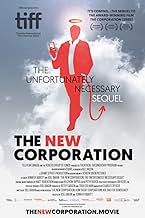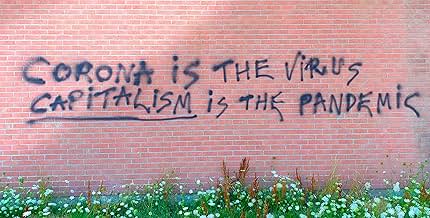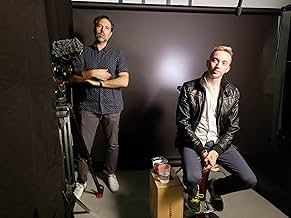The New Corporation: The Unfortunately Necessary Sequel
- 2020
- 1 Std. 45 Min.
IMDb-BEWERTUNG
7,0/10
752
IHRE BEWERTUNG
Füge eine Handlung in deiner Sprache hinzuExposes how companies are desperately rebranding as socially responsible - and how that threatens democratic freedoms.Exposes how companies are desperately rebranding as socially responsible - and how that threatens democratic freedoms.Exposes how companies are desperately rebranding as socially responsible - and how that threatens democratic freedoms.
- Regie
- Drehbuch
- Hauptbesetzung
- Auszeichnungen
- 1 Gewinn & 8 Nominierungen insgesamt
Empfohlene Bewertungen
A sequel to a 2003 documentary I first saw back in high school, the 17 years between that film and its sequel has certainly given The New Corporation a great deal of material to cover in its 106-minute runtime. It argues that corporations have become sneakier and more fake-friendly since the 2010s, seeing as tides have changed a little, and the blatant disregard for human lives isn't something they're able to get away with as easily (the 2003 original spent almost 2.5 hours diagnosing the corporation as a psychopath, or at least saying the concept of a corporation would be a psychopath if it were a person).
With a great deal of topics and issues to tackle, The New Corporation is worryingly scattershot at first. It doesn't always feel like it has much of a reason for existing in its opening scenes, and feels underwhelming and a little tired as a result. It does considerably pick up steam at a point, and thankfully became very interesting after its shaky start. It takes some complicated, difficult ideas and explains them very well; certainly in a more competent and understandable way than some YouTube videos I've seen on issues surrounding capitalism and corporate influence on politics.
I feel like it reverts to the messiness of the opening scenes in its closing scenes, unfortunately. It covers some 2020 events that are important issues, but doesn't always do the best job at linking them to issues surrounding corporations (there should be documentaries about the George Floyd protests, but maybe not this documentary - there are some loose connections to the main issues of The New Corporation, but it's not as relevant as some of the other things discussed).
It does also let a few politicians off the hook, but the fact it often comes back to "the system doesn't work; we need a new system" makes the criticisms of conservatives feel less pro-centre-left and more just against the system that lets conservative parties do damage. Others may feel differently, though; that's to be expected when politics enter into a documentary, but I don't think they could've avoided getting political altogether here.
With a great deal of topics and issues to tackle, The New Corporation is worryingly scattershot at first. It doesn't always feel like it has much of a reason for existing in its opening scenes, and feels underwhelming and a little tired as a result. It does considerably pick up steam at a point, and thankfully became very interesting after its shaky start. It takes some complicated, difficult ideas and explains them very well; certainly in a more competent and understandable way than some YouTube videos I've seen on issues surrounding capitalism and corporate influence on politics.
I feel like it reverts to the messiness of the opening scenes in its closing scenes, unfortunately. It covers some 2020 events that are important issues, but doesn't always do the best job at linking them to issues surrounding corporations (there should be documentaries about the George Floyd protests, but maybe not this documentary - there are some loose connections to the main issues of The New Corporation, but it's not as relevant as some of the other things discussed).
It does also let a few politicians off the hook, but the fact it often comes back to "the system doesn't work; we need a new system" makes the criticisms of conservatives feel less pro-centre-left and more just against the system that lets conservative parties do damage. Others may feel differently, though; that's to be expected when politics enter into a documentary, but I don't think they could've avoided getting political altogether here.
This is a well-produced documentary that starts off quite informatively by calling out how corporations use various methods to reinforce the narrative that they are socially responsible and helping the planet while simultaneously putting profits before anything. Great point made about how banks (JP Morgan is called out specifically) responsible for the 2008 crisis fancied themselves as "saviours" in the fallout by investing in a place like Detroit, where they stand to make a bundle either way. It also makes good points about corporate tax evasion and influence of their money in politics.
It really only tells one side of the story in most cases it studies however, which is a strongly socialist perspective. I'm not saying that's wrong as I myself support certain socialist ideas, but it's worth noting the politics of those being interviewed is overwhelmingly left-wing. As a result, it's more of a one-sided conversation, which is quite disappointing and a bit preachy to the viewer. As with any contemporary media these days, it also had to throw in a jab at Trump supporters because apparently they all support corporate greed and blame their struggles on minorities.
My biggest qualm is that in the last half or so it jumps from topic to topic, mostly socialist talking points, that are essentially unrelated to corporations aside from the Australian coal company. It's like I was watching a completely different documentary and it felt more like disorganized propaganda at that point.
First half, 7.5/10. Second half, 3/10. I really wish they would have gone into more depth on a couple of topics as opposed to just briefly giving left-leaning viewpoints on a cherry-picked assortment of social, economic, and political topics. It was reasonably interesting overall though, so it gets a 6.
It really only tells one side of the story in most cases it studies however, which is a strongly socialist perspective. I'm not saying that's wrong as I myself support certain socialist ideas, but it's worth noting the politics of those being interviewed is overwhelmingly left-wing. As a result, it's more of a one-sided conversation, which is quite disappointing and a bit preachy to the viewer. As with any contemporary media these days, it also had to throw in a jab at Trump supporters because apparently they all support corporate greed and blame their struggles on minorities.
My biggest qualm is that in the last half or so it jumps from topic to topic, mostly socialist talking points, that are essentially unrelated to corporations aside from the Australian coal company. It's like I was watching a completely different documentary and it felt more like disorganized propaganda at that point.
First half, 7.5/10. Second half, 3/10. I really wish they would have gone into more depth on a couple of topics as opposed to just briefly giving left-leaning viewpoints on a cherry-picked assortment of social, economic, and political topics. It was reasonably interesting overall though, so it gets a 6.
I'm amazed by the number of reviewers who were surprised to find "socialist" or "left-leaning" commentators being interviewed for this documentary--especially those reviewers who mention the original documentary favorably. Since the thesis of the documentary is (essentially) that corporations are dangerous, I'm not sure who else they expected to be interviewed. The film features some of the same interviewees from the first film: Robert Reich, Naomi Klein, Noam Chomsky, Vandana Shiva, and so on. It does also feature a couple corporate representatives, but not the number that were featured in the longer and more in-depth first documentary.
As the film indicates with clips from Margaret Thatcher, Ronald Reagan and Milton Friedman, since the 1970's, a market-based neoliberal philosophy has come to dominate political dialogue to the point that de-regulation is a central mantra of conservatives the world over (not to mention most centrist liberals). I would challenge these reviewers who demand a more "fair and balanced" presentation to scour the internet for a mainstream right-wing politician, thinker or activist that is strongly against corporate consolidation of power. You won't find one. It would be difficult, but not impossible, do do so within the mainstream centrists (Democrats in the US, or liberal parties in other countries), as well.
On the other hand, if the demand is to present these interviews alongside those who speak on behalf of the corporation, we certainly don't need further examples of that: our lives are inundated with constant pro-corporate messages, whether explicitly in advertising, or implicitly in the various privatized systems we have to navigate on an everyday basis--you are reading this review on a website that has been owned by Amazon since 1998. The pro-corporate perspective is also represented in the first film, which is more broadly about the history of corporations and their general methods of operation; this "sequel" feels more like an addendum or appendix than something to be viewed in a vacuum. In other words, if you haven't seen the first film, you should watch that first, as it is certainly still relevant and revealing.
Chris Hedges is correct that it is hard to view the complex of issues presented currently without feeling a deep sense of despair. I think that is why the second half of the film, which I see here derided by others, is both important, and ironically the subject of such angst. We are at an impasse and many of us feel powerless to counteract global forces that seem to be spiraling toward inevitable destruction. To present this documentary without some iota of hope would not only be depressing, it would be irresponsible. In the internet age, where raising someone's ire is the surest way to generate traffic, and therefore revenue, we should take at least some time to focus on the causes that bring us together, not just the ones that piss us all off.
As the film indicates with clips from Margaret Thatcher, Ronald Reagan and Milton Friedman, since the 1970's, a market-based neoliberal philosophy has come to dominate political dialogue to the point that de-regulation is a central mantra of conservatives the world over (not to mention most centrist liberals). I would challenge these reviewers who demand a more "fair and balanced" presentation to scour the internet for a mainstream right-wing politician, thinker or activist that is strongly against corporate consolidation of power. You won't find one. It would be difficult, but not impossible, do do so within the mainstream centrists (Democrats in the US, or liberal parties in other countries), as well.
On the other hand, if the demand is to present these interviews alongside those who speak on behalf of the corporation, we certainly don't need further examples of that: our lives are inundated with constant pro-corporate messages, whether explicitly in advertising, or implicitly in the various privatized systems we have to navigate on an everyday basis--you are reading this review on a website that has been owned by Amazon since 1998. The pro-corporate perspective is also represented in the first film, which is more broadly about the history of corporations and their general methods of operation; this "sequel" feels more like an addendum or appendix than something to be viewed in a vacuum. In other words, if you haven't seen the first film, you should watch that first, as it is certainly still relevant and revealing.
Chris Hedges is correct that it is hard to view the complex of issues presented currently without feeling a deep sense of despair. I think that is why the second half of the film, which I see here derided by others, is both important, and ironically the subject of such angst. We are at an impasse and many of us feel powerless to counteract global forces that seem to be spiraling toward inevitable destruction. To present this documentary without some iota of hope would not only be depressing, it would be irresponsible. In the internet age, where raising someone's ire is the surest way to generate traffic, and therefore revenue, we should take at least some time to focus on the causes that bring us together, not just the ones that piss us all off.
I don't normally write feedback on fake reviews but these are so obvious its not funny. To name democrats and in particular to call "Kshama Sawant a socialist, but an evil one at that"...... is ridiculous. A right wing opinion that brings politics into a review of a movie/documentary is not right.
Now I will watch this and review it properly.
Now I will watch this and review it properly.
I really liked the original The Corporation, so I was excited about this follow up. However, as many have mentioned this sequel is less of a documentary and more of a socialist propaganda; even if you agree with everything that is said and presented here (and as a left leaning person myself, I totally do), it offers very little in terms of an actual unbiased look at corporations like the first film did. In the end worth the watch if you are on the left side of the political spectrum, but know that it might end up just being another piece of your echo chamber.
Wusstest du schon
- WissenswertesThis program documentary was funded by the biggest media corporation in Canada
- VerbindungenFollows The Corporation (2003)
Top-Auswahl
Melde dich zum Bewerten an und greife auf die Watchlist für personalisierte Empfehlungen zu.
Details
- Erscheinungsdatum
- Herkunftsland
- Offizielle Standorte
- Sprache
- Auch bekannt als
- Новая корпорация: К несчастью необходимый сиквел
- Drehorte
- Produktionsfirmen
- Weitere beteiligte Unternehmen bei IMDbPro anzeigen
- Laufzeit
- 1 Std. 45 Min.(105 min)
- Seitenverhältnis
- 16:9 HD
Zu dieser Seite beitragen
Bearbeitung vorschlagen oder fehlenden Inhalt hinzufügen



















